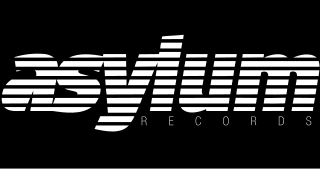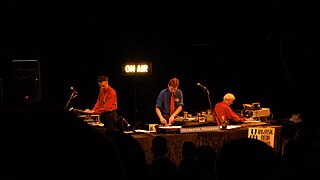Geffen Records is an American record label, founded in 1980 by David Geffen. Originally a music subsidiary of the now-defunct Geffen Pictures, it is owned by the Interscope Geffen A&M (IGA) faction of Universal Music Group (UMG).

Beck David Hansen, known mononymously as Beck, is an American musician, singer, songwriter, and record producer. He rose to fame in the early 1990s with his experimental and lo-fi style, and became known for creating musical collages of wide-ranging genres. He has musically encompassed folk, funk, soul, hip hop, electronica, alternative rock, country, and psychedelia. He has released 14 studio albums, as well as several non-album singles and a book of sheet music.

Mutations is the sixth studio album by the American songwriter Beck, released on November 3, 1998, by DGC Records. Though less commercially successful than the preceding Odelay, it won a Grammy Award for Best Alternative Music Album.

Asylum Records is an American record label, founded in 1971 by David Geffen and partner Elliot Roberts. It was taken over by Warner Communications in 1972, and later merged with Elektra Records to become Elektra/Asylum Records.

DGC Records was an American record label that operated as a division of Interscope Geffen A&M Records, which is owned by Universal Music Group.
Illegal Art is a sampling record label that was started in 1998. The label gained immediate notoriety from legal threats surrounding Deconstructing Beck, a compilation made exclusively from sampling Beck's music. This was followed by two other theme-based compilations, Extracted Celluloid and Commercial Ad Hoc. All three were co-released with Negativland's Seeland Records label and sponsored by RTMark. After these theme-based compilations, Illegal Art focused on artist releases. One of the most popular artists on the label is Girl Talk, who in 2006 released his third album, Night Ripper, to critical acclaim on the label, earning a Wired magazine Rave Award a year later.

A white label record is a vinyl record with white labels attached. There are several variations each with a different purpose. Variations include test pressings, white label promos, and plain white labels.

A bootleg recording is an audio or video recording of a performance not officially released by the artist or under other legal authority. Making and distributing such recordings is known as bootlegging. Recordings may be copied and traded among fans without financial exchange, but some bootleggers have sold recordings for profit, sometimes by adding professional-quality sound engineering and packaging to the raw material. Bootlegs usually consist of unreleased studio recordings, live performances or interviews without the quality control of official releases.

Elton John's Greatest Hits Volume III is the twenty-seventh album released by English musician Elton John. Released in 1987, 10 years after Elton John's Greatest Hits Volume II, the compilation album features his greatest hits from 1979 to 1986 and was made available only in the United States and Canada. All of the songs featured had previously been released on a previous album.
A recording contract is a legal agreement between a record label and a recording act, where the act makes an audio recording for the label to sell and promote. Artists under contract are normally only allowed to record for that label exclusively; guest appearances on other artists' records will carry a notice "By courtesy of ", and that label in question may receive a percentage of sales through publishing.

Discipline Global Mobile is an independent record label founded in 1992 by Robert Fripp and producer/online content developer David Singleton. DGM has released solo music by Fripp as well as work by various affiliated musicians and bands including King Crimson, The Vicar, the California Guitar Trio and others. The label has offices in Salisbury, England, and Los Angeles, California.

Night Ripper is the third studio album by American musician Gregg Gillis, released under his stage name Girl Talk on May 9, 2006 by Illegal Art. It is a mashup album primarily composed of samples taken from other artists' music, while also incorporating minor amounts of original instrumentation recorded by Gillis himself. Produced as one seamless piece of music before subsequently being broken into individual tracks, Night Ripper was composed by Gillis in a period of around eight months, during which he divided time between production of the album and his work as a biomedical engineer.

Greatest Hits 1976–1986 is a collection of hits by Elton John released in the United States only by MCA Records in 1992. It replaced an earlier compilation, Geffen's 1987 release Elton John's Greatest Hits Vol. 3. This was necessitated because of a shift in the control of copyrights and a resulting reshuffling of compilation albums.
Antediluvian Rocking Horse (ARH), formed 1994 St. Kilda, Australia, is an audio project maintained by two core artists credited as DJ2 and DJ3. DJ2 is Paul Wain, a sculptor and graduate of the Victorian College of the Arts. DJ3 is Susan King, a collage artist, writer and anti-copyright advocate. The composer Ollie Olsen was also a member. The project produces music and soundscapes that are entirely recycled from other recorded works.

Good Copy Bad Copy is a 2007 documentary film about copyright and culture in the context of Internet, peer-to-peer file sharing and other technological advances, directed by Andreas Johnsen, Ralf Christensen, and Henrik Moltke. It features interviews with many people with various perspectives on copyright, including copyright lawyers, producers, artists and filesharing service providers.
Plunderphonics is a music genre in which tracks are constructed by sampling recognizable musical works. The term was coined by composer John Oswald in 1985 in his essay "Plunderphonics, or Audio Piracy as a Compositional Prerogative", and eventually explicitly defined in the liner notes of his Grayfolded album. Plunderphonics is a form of sound collage. Oswald has described it as a referential and self-conscious practice which interrogates notions of originality and identity.

Negativland is an American experimental music band that originated in the San Francisco Bay Area in the late 1970s. The core of the band consists of Mark Hosler, David Wills, Peter Conheim and Jon Leidecker. Negativland has released a number of albums ranging from pure sound collage to more musical expositions. These have mostly been released on their own label, Seeland Records. In the late 1980s and early 1990s, they produced several recordings for SST Records, most notably Escape from Noise, Helter Stupid and U2. Negativland were sued by the band U2's record label, Island Records, and by SST Records, which brought them widespread publicity and notoriety. The band is also part of the Church of the SubGenius parody religion. Negativland coined the term culture jamming in 1984. Don Joyce added it to the album JamCon '84 in the form of "culture jammer". The band took their name from a Neu! track, with their record label Seeland Records also being named after another Neu! track.

In sound and music, sampling is the reuse of a portion of a sound recording in another recording. Samples may comprise elements such as rhythm, melody, speech, or sound effects. A sample can be brief and only incorporate a single musical note, or it can consist of longer portions of music, and may be layered, equalized, sped up or slowed down, repitched, looped, or otherwise manipulated. They are usually integrated using electronic music instruments (samplers) or software such as digital audio workstations.
File sharing is the practice of distributing or providing access to digital media, such as computer programs, multimedia, documents or electronic books. Common methods of storage, transmission and dispersion include removable media, centralized servers on computer networks, Internet-based hyperlinked documents, and the use of distributed peer-to-peer networking.

Ronald K. Keys Jr. aka DJ Swamp is an American hip hop DJ, turntablist, producer and vocalist. He was born in Cleveland, Ohio, United States. He currently resides in Los Angeles, United States. In 1996, he won the title of US DMC Champion, his first year entering the tournament. Swamp toured with Beck for four years and later broke away into a solo career with his release "Never is Now" in 2001. Alternative Press gave "Never is Now" an 8/10 rating.













